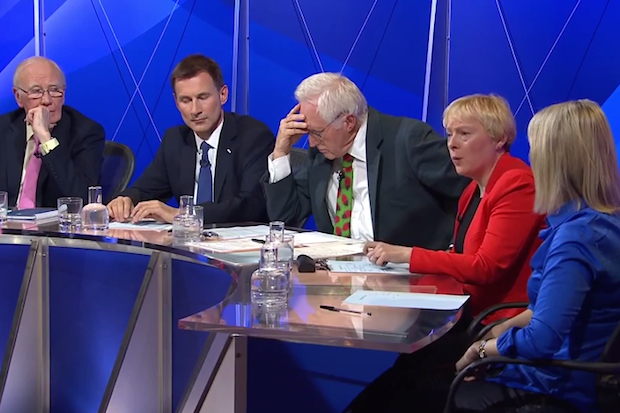When I first learned about Athenian democracy as a teenager I was baffled that they could have decided government positions by lottery; what was to stop someone totally unsuitable and useless from ending up in control? But then I look at the current Labour front bench and think, how bad could it be?
I’m thinking in particular of Shadow Leader of the House Angela Eagle, whose performance on Question Time last night was a perfect illustration of how low the tone of so much political debate is – especially that involving manufactured outrage.
The outrage in question was over Lord Freud’s comments about the disabled and the minimum wage, which Labour cooked up in an attempt to make their opponents look like the nasty party. Freud had merely answered a question from a man who had a disabled family member who was unable to find work at the minimum wage. Would it not be sensible therefore, he asked Freud, to allow firms to pay less and have the government top up the difference; as is done in numerous countries and which disability campaigners have called for in the past. Freud said he’d think about ways to increase the number of disabled people in work, because some are ‘not worth the full [minimum] wage’.
Out of this Ed Miliband managed to cook up some totally artificial anger and the Conservatives, with the moral cowardice that is their trademark, apologised rather than telling Miliband to grow up and try dealing with the world how it is, not how it should be.
Manufactured outrage is not a joke. Since the totalitarian-lite ideology of political correctness was born on American campuses after the Second World War it’s been used to snuff out unpopular ideas and legitimate lines of scientific inquiry; it’s a sub-rational style of argument that has no more place in a mature democracy than flag-waving ultra-nationalism or religious fundamentalism. Indeed it appeals to the same emotional parts of the brain. As I wrote in today’s Express:
‘It makes Question Time unwatchable because rational arguments are drowned out by indignant, reason-free protests on behalf of this or that disadvantaged group.’
If I were a producer for the programme I’d have any politician who tried the outrage card sent off to a corner for ten minutes with a can of Coke and some crisps while the grown-ups did the talking. Many politicians are wont to play the card, although Labour MP Emily Thornberry in particular stands out for her use of it, her response to the debate on marriage tax breaks being along the lines of ‘as a child of a hard-working single parent I’m offended by this’, as if that were a winning argument against the vast data on the beneficial effect of being brought up by married parents on childhood outcomes.
Anyway, it the reaction to this that made last night’s episode of Question Time so pleasing. Eagle tried to make everyone feel outraged, but instead the audience turned against her, accusing the MP of distorting Freud’s words for party political gain; it was like watching the crowd turn against Ceausescu in Bucharest, and the first time I’ve ever seen a QT crowd react like this. I think I may have to move to Newbury: If that’s what their Question Time audience is like, imagine how sensible the population as a whole must be.
As for Eagle, her solution to the problem was, rather than face the reality of the market, as Freud offensively did, to ‘evangelise’ firms to pay more, whatever that means (more equality and diversity laws and regulations?). It makes you think: All in all the Athenian system wasn’t that bad.







Comments